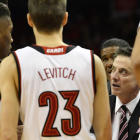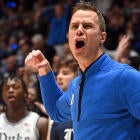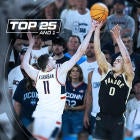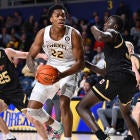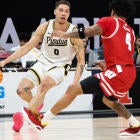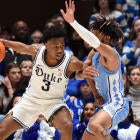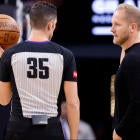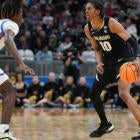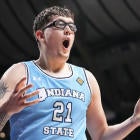A significant legal turn in the infamous escort scandal connected to the Louisville men's basketball program transpired on Thursday when a Jefferson County (Ky.) grand jury elected to not indict the woman responsible for bringing the saga to public light.
Katina Powell, a self-described escort and someone who wrote in her 2015 book, "Breaking Cardinal Rules," that she helped arrange multiple events for Louisville players and prospects that involved strippers and hookers, will not be put under oath. And neither will Andre McGee, a former Louisville director of basketball operations who was the single Cardinals staffer tied to the violations.
Louisville sex scandal timeline
This means neither McGee nor Powell will be handed charges in the matter. The grand jury's decision also sidesteps the scenario of any Louisville coaching staff member -- most notably Hall of Famer Rick Pitino -- from being subject to a subpoena and requiring to potentially testify under oath in court. The decision is interesting primarily because of the money that was determined, by the NCAA's own investigation, to have switched hands from McGee to Powell.
Powell, in her book, said she brought her two underage daughters to the Louisville parties.
Via the Louisville Courier-Journal:
They faced possible charges of human trafficking, complicity to statutory rape or engaging in a criminal syndicate. In Powell's book, subtitled "Confessionals of An Escort Queen," which she co-wrote with journalist Dick Cady, she wrote her two younger daughters were 15 and 17 when she allegedly began supplying them and other women to entertain prospects and players.
Defense lawyers not connected to the case had said the key to charging them was whether police could pinpoint whether crimes occurred when Powell's younger daughters were under age.
Commonwealth Attorney Tom Wine said an investigation that included U of L Police and three prosecutors from the commonwealth attorney's office found that no under-aged girls were used to "entertain recruits."
All of the women identified in the book also denied having sexual contact with any of the recruits or receiving payment for sexual acts.
...
Under Kentucky law, ignorance of a minor victim's actual age is not a defense to human trafficking charges.Powell and McGee could only face felony charges because the statute of limitations for misdemeanors is one year.
As for how this connects to the NCAA's case with Louisville: it doesn't. Louisville accepted a postsason ban in the 2015-16 season, took scholarship hits, and is currently awaiting a final verdict on whether or not Pitino should be ruled responsible for having McGee go rogue while on his staff. Louisville has formally argued with the NCAA that Pitino could not have prevented McGee doing what he did. If the NCAA ultimately disagrees, Pitino could face a suspension in the 2017-18 season.
Via WDRB, this is the statement on behalf of the Commonwealth Attorney's office in charge of the case.
After a thorough investigation by the University of Louisville Police Department and a comprehensive review by three prosecutors in the Office of the Jefferson County Commonwealth's Attorney into possible criminal charges arising out of events documented in Katina Powell's book, Breaking Cardinal Rules, a Jefferson County grand jury has declined to return an indictment against Katina Powell or Andre McGee. Following a presentation today of the evidence that authorities had been able to compile regarding potential crimes, the grand jury agreed with the advice of the Commonwealth's Attorney office that there is currently insufficient evidence to bring criminal charges against either person.
In Powell's book, she stated that she had provided women to entertain high school basketball players being recruited by the University of Louisville basketball program. She stated that these women were provided at the request of McGee, the director of basketball operations at the University of Louisville. The activities, which took place at Minardi Hall on the University of Louisville campus, were alleged to include providing sex to the recruits. Powell further alleged that all of the activities were paid for by McGee.
Upon publication of the book, law enforcement authorities were originally concerned that Powell used under-aged girls to entertain the recruits. Once it was determined that no under-aged girls were used, the investigation focused on Prostitution, Unlawful Transactions with a Minor, and other possible criminal charges. During the investigation, all of the women identified in the book denied having sexual contact with any of the recruits or receiving payment for sex acts. Interviews with recruits revealed that there were instances of sexual contact with unknown women. However, none of the recruits were able to confirm any payments had been made to the women by McGee or anyone else. Nor could the recruits positively identify any of the women with whom they had sexual contact.
After reviewing all of the interviews and evidence, the Commonwealth Attorney's office concluded that there simply was not the legally required independent corroboration of the allegations made in Powell's book to justify recommending that Powell or McGee be indicted and to prove guilt beyond a reasonable doubt at trial. Kentucky law requires that a confession of a defendant, unless made in open court, will not support a conviction unless the confession is supported by independent evidence.
Commonwealth's Attorney Tom Wine stated: "We strongly commend the University of Louisville Police Department for their commitment to investigating whether criminal activity had occurred on the University of Louisville campus during the recruitment of these high school basketball players, but in the final analysis there is not sufficient credible evidence assembled to support bringing criminal charges against these individuals."
The matter is not over for Powell, who still faces a civil lawsuit, which was brought on by a former Miss Kentucky.
The NCAA's final stage of investigating and handing out sanctions on the Louisville case is expected later this year.












